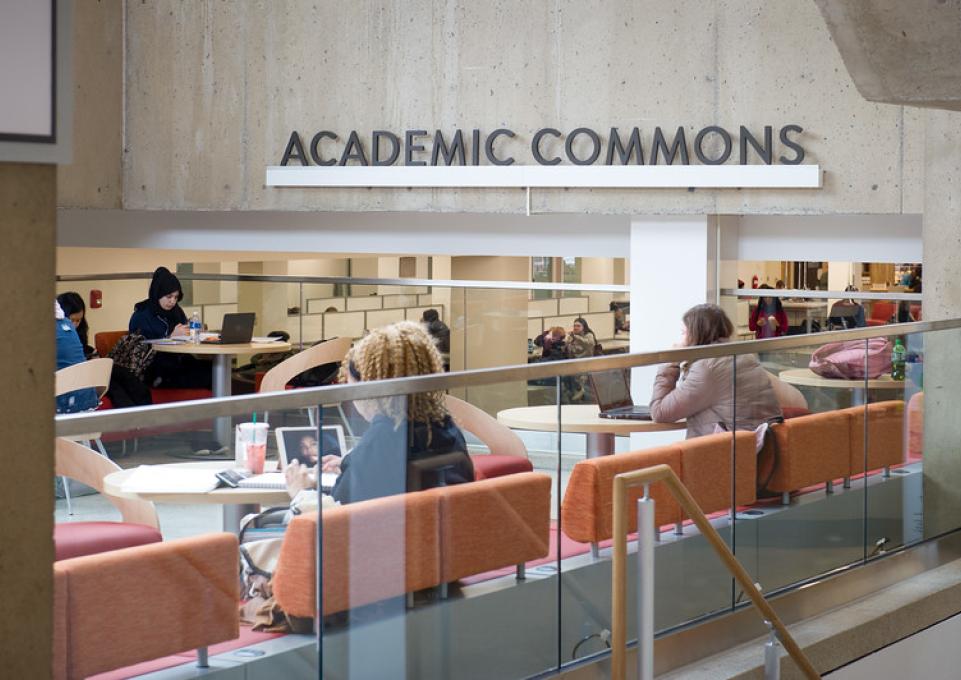
When students come to Buffalo State, they’re immersed in rich and challenging academic subjects; however, they are not on their own when it comes to acing those subjects or figuring out everything it takes to succeed in college.
As part of Buffalo State’s Academic Commons (AC), students receive advising, get help with coursework, and hone strategies for study, note-taking, and test-taking. They can also connect with the campus’s Student Accessibility Services (SAS) and the Educational Opportunity Program (EOP). The goal is to enhance students’ skills, abilities, and confidence so they stay in school and graduate.
“There is no single strategy to improve retention and student success,” said Academic Commons director Aimee Woznick, who oversees the nearly 30 academic advisers, tutors, and other personnel associated with the center. “Instead, we’re taking a more holistic approach to student support.”
Currently, AC services are scattered across campus—from Twin Rise to Buckham Hall. But starting in summer 2020, the AC will provide all services on the first floor of the renovated E. H. Butler Library.
In a “one-stop shop” of services, the new AC will house the Writing Center, the Math Center, EOP’s Academic Center for Excellence, the Advising Center, and SAS, which includes a new testing center.
“The Academic Commons will enhance each office’s capacity to serve students while adding many new features that improve reception, triage, scheduling, program visibility, collaborative learning, and student convenience,” said interim provost James Mayrose. “This vision should increase student use of these campus services significantly and transform the culture of learning at Buffalo State.”
The AC began in 2016 with the Oishei Drop-in Advising Center, funded by a $75,000 grant from the John R. Oishei Foundation. Campus administrators, including President Katherine Conway-Turner and former provost Melanie Perreault, conceptualized the AC as a place to centralize all academic support services.
A $2.19 million Title III grant from the U.S. Department of Education is covering the ongoing costs of the AC, along with data analytics and monitoring of retention efforts. With the AC, the campus can realize the “Remedial Pathways” and “Finish in Four” initiatives articulated in the SUNY Completion Agenda. The following is an overview of two of the services included under the AC umbrella.
Advising
All first-year students start out with a professional staff adviser who not only helps them select courses but also connects them with other campus resources. Once students earn 24 credits (typically in their sophomore year), they transition to a faculty adviser in their major who can offer guidance on next steps, be it graduate school or a career. Advisers reach out to students three times a semester or more, depending on student need.
“Advisers work with students to find out what success looks like to them and how to explore their areas of interest and set goals,” Woznick said. “Advisers also connect students to critical services if they’re facing challenges such as food insecurity or mental health stressors.”
Tutoring
Nationwide studies, including one from the Journal of College Reading and Learning, indicate that students who regularly go for tutoring increase their grades by a letter or more. This is why Woznick hopes that more students will take advantage of this free service.
Currently, more than 2,000 students enrolled in courses ranging from Introduction to Contemporary Mathematics to Calculus III get help each year with their coursework through a professional, faculty, or peer tutor within the Math Center, currently located in Buckham Hall A203.
Meanwhile, the Writing Center, located in Butler Library 310, handles approximately 4,000 appointments a year. Rather than just fixing grammar or other technical issues, the Writing Center helps students develop ideas and build stronger writing skills to make students independent writers, noted the center’s director, assistant professor of English Maggie Herb.
Students also receive tutoring in a multitude of other subjects, including music, biology, and French.
Woznick pointed out that tutoring isn’t only for students at risk of failing a course.
“Some students with an A– in a course will go to tutoring to get an A+,” she said.
Future
When the AC moves into its permanent home, its increased visibility should result in more students connecting with a range of service areas, Woznick said, especially first-generation students early in their college careers.
“It’s a huge cultural shift coming from high school to college,” she said. “There are lots of pieces to put into place before a student feels successful.”
